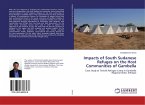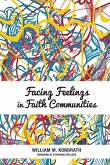This interdisciplinary volume investigates com-munity in postcolonial language situations, texts, and media. In actual and imagined communities, membership assumes shared features - values, linguistic codes, geographical origin, gender, sexuality, ethnicity, religion, professional interests and practices. How is membership in such communities constructed, manifested, tested or contested? What new forms have emerged in the wake of globalization, translocation, and digital media? Contributions in linguistic, literary, and cultural studies explore the role of communication, narratives, memory, and trauma in processes of (un)belonging.
One section treats communication and the speech community. Here, linguistic contribu-tions investigate the concept of the native speaker in World Englishes, in socio-cultural communities identified by styles of verbal duelling, in diaspora communities, physical and digital, where identification with formerly stigmatized linguistic codes acquires newcurrency. Divisions and alignments in digital communities are at stake in postcolonial African countries like Cameroon where identification with ex-colonizer and ex-colonized is a hot issue. Finally, discourse communities also exist in such traditional media as newspapers (e.g., the Indian tabloid in English).
In a section devoted to narrative and narration, the focus is on literary perspectives - post-colonial memory, trauma, and identity in Caribbean literary works by David Chariandy and Pauline Melville and in Australian Aboriginal fiction; narratives of banditry in colonial India; xenophobia and urban space in South Africa; human-animal community crossings and anthropomorphism in Life of Pi.
A third section, on linguistic crossings in transnational music styles in global and Ugandan music industries, examines language, style, and belonging in music cultures. The volume closes with a controversial debate on the agendas of academic/non-academic and postcolonial/Western communities with regard to homophobia in Jamaican dancehall culture.
CONTRIBUTORS
Eric A. Anchimbe, Susan Arndt, Roman Bartosch, Carolyn Cooper, Daria Dayter, Dagmar Deuber, Tobias Döring, Stephanie Hackert, Caroline Koegler, Stephan Laqué, Andrea Moll, Susanne Mühleisen, Jochen Petzold, Katja Sarkowsky, Britta Schneider, Anne Schröder, Jude Ssempuuma, Robert JC Young
Hinweis: Dieser Artikel kann nur an eine deutsche Lieferadresse ausgeliefert werden.
One section treats communication and the speech community. Here, linguistic contribu-tions investigate the concept of the native speaker in World Englishes, in socio-cultural communities identified by styles of verbal duelling, in diaspora communities, physical and digital, where identification with formerly stigmatized linguistic codes acquires newcurrency. Divisions and alignments in digital communities are at stake in postcolonial African countries like Cameroon where identification with ex-colonizer and ex-colonized is a hot issue. Finally, discourse communities also exist in such traditional media as newspapers (e.g., the Indian tabloid in English).
In a section devoted to narrative and narration, the focus is on literary perspectives - post-colonial memory, trauma, and identity in Caribbean literary works by David Chariandy and Pauline Melville and in Australian Aboriginal fiction; narratives of banditry in colonial India; xenophobia and urban space in South Africa; human-animal community crossings and anthropomorphism in Life of Pi.
A third section, on linguistic crossings in transnational music styles in global and Ugandan music industries, examines language, style, and belonging in music cultures. The volume closes with a controversial debate on the agendas of academic/non-academic and postcolonial/Western communities with regard to homophobia in Jamaican dancehall culture.
CONTRIBUTORS
Eric A. Anchimbe, Susan Arndt, Roman Bartosch, Carolyn Cooper, Daria Dayter, Dagmar Deuber, Tobias Döring, Stephanie Hackert, Caroline Koegler, Stephan Laqué, Andrea Moll, Susanne Mühleisen, Jochen Petzold, Katja Sarkowsky, Britta Schneider, Anne Schröder, Jude Ssempuuma, Robert JC Young
Hinweis: Dieser Artikel kann nur an eine deutsche Lieferadresse ausgeliefert werden.








